Refer to our Texas Go Math Grade 4 Answer Key Pdf to score good marks in the exams. Test yourself by practicing the problems from Texas Go Math Grade 4 Unit 6 Answer Key Personal Financial Literacy.
Texas Go Math Grade 4 Unit 6 Answer Key Personal Financial Literacy
Show What You Know
Add Decimals Estimate. Then find the sum.
Question 1.
Estimate:

Answer:
Question 2.
Estimate:

Answer:
Subtract Decimals Estimate. Then find the difference.
Question 3.
Estimate:

Answer:
Question 4.
Estimate:

Answer:
Multiply 3-Digit and 4-Digit Numbers by 1-Digit Numbers
Find the product.
Question 5.
684 × 7
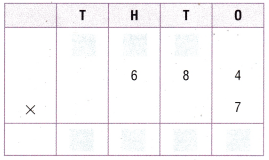
Answer:
Question 6.
1,157 × 4
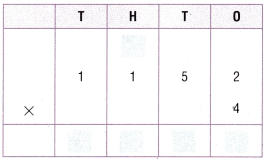
Answer:
Vocabulary Builder
Preview Wards
- budget
- financial institution
- fixed expense
- interest
- loan
- profit
- variable expense
Visualize It
Write an example for each term in the chart.
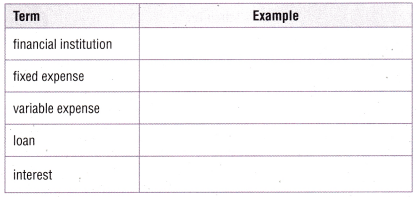
Answer:
Understand Vocabulary
Complete the sentences by using the preview words.
Question 1.
An organized plan for spending and saving money is called a __________.
Answer:
Question 2.
A __________ is one in which the amount changes based on need or choice.
Answer:
Question 3.
A __________ occurs regularly and the amount does not change.
Answer:
Question 4.
Money that is lent by a bank or other financial institution is called a __________ .
Answer:
Question 5.
__________ is the amount left after all the expenses are subtracted from the amount of money received from selling an item or service.
Answer:
Question 6.
A __________ keeps money safe, lends money, and borrows money.
Answer:
Reading & Writing Math
Vocabulary
You can use what you know about adding and subtracting whole numbers to add and subtract money amounts.
1. On the way home from school, Janine bought a bunch of bananas for $3.00. She gave the clerk a ten-dollar bill. How much change should she get back?

Answer:
An input/output table shows how input numbers and output numbers are related. A rule tells what to do to the input to get the output. You can use an input/output table to help you solve problems.
Janine wants to know how much it will cost her to buy 4 bunches of bananas. Complete the input/output table to show how much the bananas will cost.
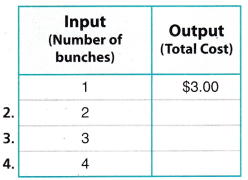
5. The rule is: ______________
6. Four bunches of bananas will cost ______________ .
7. How much would 8 bunches of bananas cost? ______________
Answer:
Writing Make an input/output table that shows the total cost of 5 DVDs if each DVD costs $13.00.
Answer:
Reading Look for this book in your library. Once Upon a Dime: A Math Adventure, by Nancy Kelly Allen
Answer:
Get Ready GAME
Make a Profit
Object of the Game Determine expenses and calculate the profit.
Materials
- 3 number cubes each labeled 1-6
- Monthly Worksheet
- Pencil or marker
Set Up
Each player becomes the owner of a made up company that sells items. Each player uses a worksheet to find the company’s expenses and profit for one month.
Number of Players: 2 to 4 players
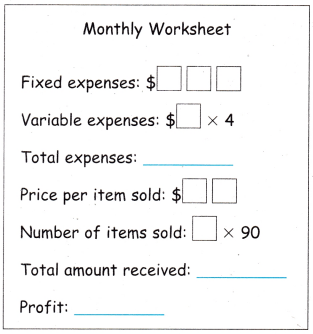
How to Play
Question 1.
Player 1 tosses 3 cubes and arranges the digits in any order to determine the company’s fixed expenses.
Answer:
Question 2.
Player 1 tosses one cube, and multiple by 4 to determine the company’s monthly variable expenses. Player 1 then finds their total expenses.
Answer:
Question 3.
Player 1 tosses two cubes and arranges the digits in any order to determine the price of each item sold.
Answer:
Question 4.
Player 1 tosses one cube and multiplies by 90 to determine the number of items sold. Player 1 then finds the total amount received for the number of items sold.
Answer:
Question 5.
Each player repeats the four steps and computes his or her profit for ‘the month.
Answer:
Question 6.
The player with the greatest profit for the month wins the game.
Answer: